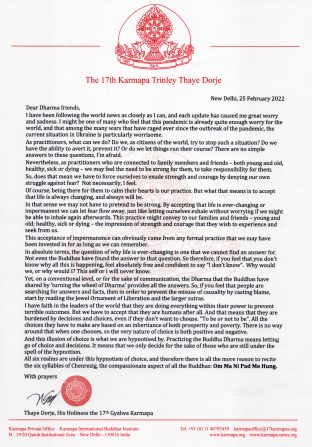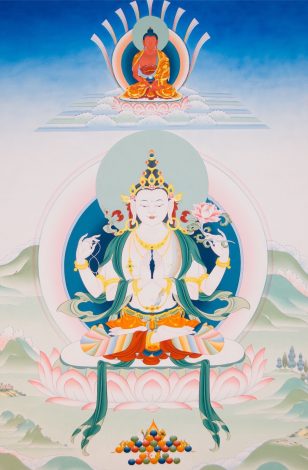Karmapa Public Course 2025: Impressions
March 15, 2025
Thaye Dorje, His Holiness the 17th Gyalwa Karmapa, shares the following message after the recent events in Ukraine.


A transcript of the letter follows:
Dear Dharma friends,
I have been following the world news as closely as I can, and each update has caused me great worry and sadness. I might be one of many who feel that this pandemic is already quite enough worry for the world, and that among the many wars that have raged ever since the outbreak of the pandemic, the current situation in Ukraine is particularly worrisome.
As practitioners, what can we do? Do we, as citizens of the world, try to stop such a situation? Do we have the ability to avert it, prevent it? Or do we let things run their course? There are no simple answers to these questions, I’m afraid.
Nevertheless, as practitioners who are connected to family members and friends – both young and old, healthy, sick or dying – we may feel the need to be strong for them, to take responsibility for them.
So, does that mean we have to force ourselves to exude strength and courage by denying our own struggle against fear? Not necessarily, I feel.
Of course, being there for them to calm their hearts is our practice. But what that means is to accept that life is always changing, and always will be.
In that sense we may not have to pretend to be strong. By accepting that life is ever-changing or impermanent we can let fear flow away, just like letting ourselves exhale without worrying if we might be able to inhale again afterwards. This practice might convey to our families and friends – young and old; healthy, sick or dying – the impression of strength and courage that they wish to experience and seek from us.
This acceptance of impermanence can obviously come from any formal practice that we may have been invested in for as long as we can remember.
In absolute terms, the question of why life is ever-changing is one that we cannot find an answer for. Not even the Buddhas have found the answer to that question. So therefore, if you feel that you don’t know why all this is happening, feel absolutely free and confident to say “I don’t know”. Why would we, or why would I? This self or I will never know.
Yet, on a conventional level, or for the sake of communication, the Dharma that the Buddhas have shared by ‘turning the wheel of Dharma’ provides all the answers. So, if you feel that people are searching for answers and facts, then in order to prevent the misuse of causality by casting blame, start by reading the Jewel Ornament of Liberation and the larger sutras.
I have faith in the leaders of the world that they are doing everything within their power to prevent terrible outcomes. But we have to accept that they are humans after all. And that means that they are burdened by decisions and choices, even if they don’t want to choose. “To be or not to be”. All the choices they have to make are based on an inheritance of both prosperity and poverty. There is no way around that when one chooses, so the very nature of choice is both positive and negative.
And this illusion of choice is what we are hypnotised by. Practicing the Buddha Dharma means letting go of choice and decisions. It means that we only decide for the sake of those who are still under the spell of the hypnotism.
All six realms are under this hypnotism of choice, and therefore there is all the more reason to recite the six syllables of Chenrezig, the compassionate aspect of all the Buddhas: Om Ma Ni Pad Me Hung.
With prayers
Thaye Dorje, His Holiness the 17th Gyalwa Karmapa
Follow Karmapa on social media